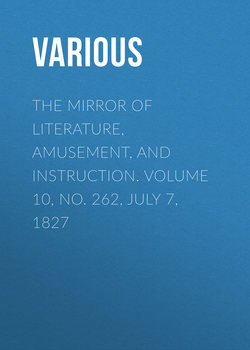Читать книгу The Mirror of Literature, Amusement, and Instruction. Volume 10, No. 262, July 7, 1827 - Various - Страница 2
BYRON AND OTHER POETS COMPARED
Оглавление(For the Mirror.)
There is a natural stimulus in man to offer adoration at the shrine of departed genius.—
"There is a tear for all that die."
But, when a transcendant genius is checked in its early age—when its spring-shoots had only began to open—when it had just engaged in a new feature devoted to man, and man to it, we cannot rest
"In silent admiration, mixed with grief."
Too often has splendid genius been suffered to live almost unobserved; and have only been valued as their lives have been lost. Could the divine Milton, or the great Shakspeare, while living, have shared that profound veneration which their after generations have bestowed on their high talents, happier would they have lived, and died more extensively beloved.
True, a Byron has but lately paid a universal debt. His concentrated powers—his breathings for the happiness and liberty of mankind—his splendid intellectual flowers, culled from a mind stored with the choicest exotics, and cultivated with the most refined taste are all still fresh in recollection. As the value of precious stones and metals have become estimated by their scarcity, so will the fame of Byron live.
A mind like Lord Byron's,
"–born, not only to surprise, but cheer
With warmth and lustre all within its sphere,"
was one of Nature's brightest gems, whose splendour (even when uncompared) dazzled and attracted all who passed within its sight.
"So let him stand, through ages yet unborn."
As comparison is a medium through which we are enabled to obtain most accurate judgment, let us use it in the present instance, and compare Lord Byron with the greatest poets that have preceded him, by which means the world of letters will see what they have really lost in Lord Byron. To commence with the great Shakspeare himself, to whom universal admiration continues to be paid. Had Shakspeare been cut off at the same early period as Byron, The Tempest, King Lear, Othello, Macbeth, Julius Caesar, Coriolanus, and several others of an equal character, would never have been written. The high reputation of Dryden would also have been limited—his fame, perhaps, unknown. The Absalom and Achitophel is the earliest of his best productions, which was written about his fiftieth year; his principal production, at the age of Byron, was his Annus Mirabilis; for nearly the whole of his dramatic works were written at the latter part of his life. Pope is the like situated; that which displayed most the power of his mind—which claims for him the greatest praise—his Essay on Man, &c. appeared after his fortieth year. Windsor Forest was published in his twenty-second or twenty-third year, both were the labour of some years; and the immortal Milton, who published some few things before his thirtieth year, sent not his great work, Paradise Lost, to the world until he verged on sixty.
With the poets, and the knowledge of what Byron was, we may ask what he would have been had it pleased the Great Author of all things to suffer the summer of his consummate mental powers to shine upon us? Take the works of any of the abovenamed distinguished individuals previous to their thirty-eighth year, and shall we perceive that flexibility of the English language to the extent that Byron has left behind him? His versatility was, indeed, astonishing and triumphant. His Childe Harold, the Bride of Abydos, the Corsair, and Don Juan, (though somewhat too freely written,) are established proofs of his unequalled energy of mind. His power was unlimited; not only eloquent, but the sublime, grave and gay, were all equally familiar to his muse.
Few words are wanted to show that Byron was not depraved at heart; no man possessed a more ready sympathy, a more generous mind to the distressed, or was a more enthusiastic admirer of noble actions. These feelings all strongly delineated in his character, would never admit, as Sir Walter Scott has observed, "an imperfect moral sense, nor feeling, dead to virtue." Severe as the
"Combined usurpers on the throne of taste"
have been, his character is marked by some of the best principles in many parts of his writings.
"The records there of friendships, held like rocks,
And enmities like sun-touch'd snow resign'd,"
are frequently visible. His glorious attachment to the Grecian cause is a sufficient recompense for previous follies exaggerated and propagated by calumny's poisonous tongue. In a word, "there is scarce a passion or a situation which has escaped his pen; and he might be drawn, like Garrick, between the weeping and the laughing muses."
A. B. C.
